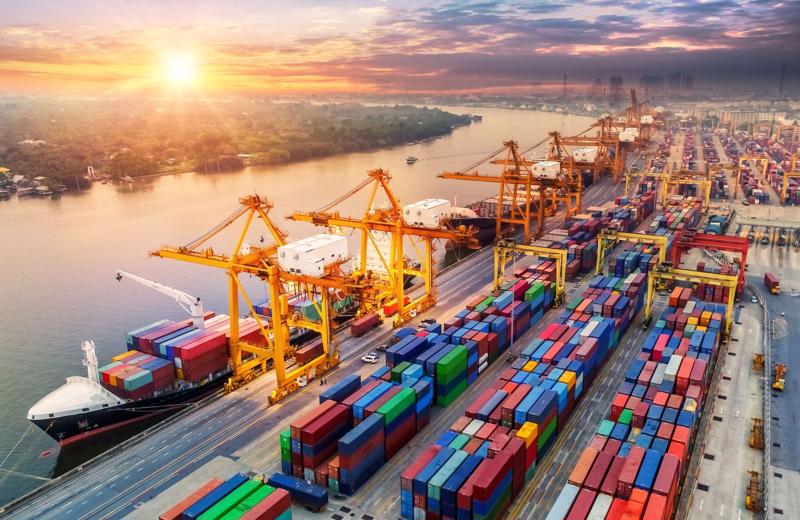The latest foreign direct investment (FDI) data showed that global FDI inflows dropped by 2 per cent in 2023 to a total of $1.33 trillion, while ASEAN saw record inflows for the third year with a gain of 1.2 per cent to $226.3 billion, driven by robust economic growth and strong integration into global value chains.
The Global Direct Investment Flow Separation
Global FDI inflows totaled $1.33 trillion in 2023, a 2 per cent drop from 2022, which the United Nations Conference on Trade and Development (UNCTAD) attributed to the “wild swings” in a small number of European conduit economies, partly due to the global minimum tax (GMT) for large multinational enterprises (MNEs) as well as “a big drop” in the value of cross-border M&As in developed markets. Excluding the effect of these conduits, the headline global FDI inflows in 2023 experienced a far larger decline, down by more than 10 per cent year-on-year, while inflows to developing markets shrank by 7 per cent, led by Developing Asia, the largest FDI recipient, which dropped by 8 per cent, according to UNCTAD.
In the global context of a decline in foreign direct investment (FDI), ASEAN continues to record its third consecutive year of growth with a 1.2 per cent increase to reach $226.3 billion in 2023.
Despite the decrease, FDI inflows into Asia remain at high levels, reaching $621 billion, and the region stayed as the largest recipient of FDI, accounting for nearly half of global inflows.
The East Asian region (including China, Japan, and South Korea) also experienced significant declines due to China's drop, but stable flows into ASEAN were maintained thanks to strong economic growth and numerous global value chain connections.
In Developing Asia, inflows to China fell by 14 per cent to $163.3 billion, and to India plunged by 43 per cent year-on-year to $28.2 billion. In contrast, inflows to ASEAN rose 1.2 per cent to $226.3 billion in 2023, although the distributions were uneven, gripped by tight monetary policy conditions worldwide. Among ASEAN members, Singapore remained the largest destination, rising 13 per cent to nearly $160 billion, while Vietnam saw a smaller increase of 3.4 per cent to $18.5 billion. However, Indonesia, Malaysia, and Thailand reported year-on-year declines of 15 - 59 per cent, following broader global trends during the year as economic activities slowed in response to tight monetary policies by various central banks.
The United States remained the largest contributor of FDI inflows to ASEAN since at least 2019. The US accounted for 32 per cent share of total inflows to ASEAN in 2023, more than doubling from the 13 per cent share in 2022 and the average value of 12 per cent in 2010-2019, suggesting that rising US-China tensions, the shifting of supply chains, and de-risking/ “friend-shoring” continue to be the main motivating factors.
Similar to the US but at a much smaller scale, inflows from Europe have increased significantly compared to historical averages. For example, inflows from Switzerland and Germany saw multiple times of increases compared to the 2010-2019 period.
Prospects positive for ASEAN in the next 3-5 Years
Are FDI inflows to ASEAN sustainable in the years ahead? And will the decline in key ASEAN markets (Indonesia, Malaysia, and Thailand) reverse?
Most economic experts believe that ASEAN will continue to be a destination for FDI in the next 3-5 years. Specifically, in 2024, the economic growth of the ASEAN region is expected to remain very positive, particularly in some major consumer markets in Southeast Asia such as Indonesia, the Philippines, Vietnam, and Malaysia, due to stable demand from these countries and improved export activities of goods and services.

Mr. Suan Teck Kin, Head of Research and Executive Director of Global Economics and Markets Research at UOB Group, said that the factors supporting the region's FDI attraction prospects are demonstrated through:
(1) The signing of the MOU between the Singapore and Malaysia governments in January 2024 to implement the Johor-Singapore Special Economic Zone (JS-SEZ);
(2) Increased integration of the region, reflected in some recent developments, including the entering into force of the Regional Comprehensive Economic Partnership (RCEP) in 2022, the sizeable intra-ASEAN flows of trade and FDI, and increased adoption of cross-border payments via QR and digital channels;
(3) Population – The demographic dividend will be unfolding in the years ahead as income rises and wealth increases for the large pool of young population;
(4) Domestic political stability – Power transitions after recent elections in Indonesia, Malaysia, and Thailand have been smooth and uneventful, demonstrating the increased maturity of these countries, which ensures policy continuity and stability in these key ASEAN members for at least the next 3-5 years.
“ASEAN remains a unique location for companies which are progressively able to localize their production capability and contents as supply chains evolve to become more robust and extensive, particularly in the areas of intermediate inputs within the electronics sector,” Mr. Teck Kin emphasized.
However, geoeconomic fragmentation is also reshaping the landscape of global investment, with fragmenting trade networks, diverging regulatory environments, and the reconfiguring of international supply chains creating both obstacles and isolated opportunities, with some countries benefiting from investments in global value chain-intensive manufacturing while others struggle to participate in the global economy. This is a clear reminder that governments and businesses will need to stay nimble and competitive in such an environment.
The Shining of Vietnam
As China slows, secular growth opportunities are opening up in ASEAN, thanks to tailwinds of global supply chain reorientation and favorable demographics.

And within the vast picture of the ASEAN region, Vietnam stands out as a gateway to this area. This country is seen as the “highlight” of economic growth in Southeast Asia and is increasingly attracting the attention of global investors.
Vietnam now ranks third in the region for attracting foreign investment, trailing only behind Indonesia and Singapore. As a vital cog in global supply chains, it has become a preferred destination for corporations looking to diversify their operations amid global uncertainties, particularly within the context of “China 1” strategies.
The actual foreign direct investment (FDI) inflow to Vietnam reached a record high of $23.2 billion in 2023, surpassing the previous record of $22.4 billion in 2022. Meanwhile, registered FDI for the year 2023 increased by 32 per cent to $36.6 billion from $27.7 billion in 2022, nearly reaching the historic high of $38 billion in 2019. It is predicted that Vietnam's GDP attraction will also achieve positive results this year, with the figure of FDI capital disbursed in Vietnam from January to June 2024 reaching $10.8 billion, more than double the amount of $4.6 billion in Q1 of 2024.
This strong performance is attributed to significant improvements in Vietnam's infrastructure, including investments in seaports, highways, and industrial parks, which have enhanced transport and trade capabilities. Additionally, efforts to green products towards sustainable development, coupled with investment incentive policies, interest rate reductions, tax breaks, and price stabilization, have turned Vietnam into one of the most attractive destinations for FDI in the region.
The positive forecast for foreign direct investment inflows is expected to continue as a driving force for Vietnam's growth this year. This is evidenced by the optimistic projections of GDP growth in 2024 made by various financial institutions. Specifically, in its latest report, UOB Bank maintains its projection of Vietnam's GDP growth at 6 per cent in 2024.
The World Bank's recent report released on August 26, 2024, also raises the forecasted economic growth rate of Vietnam in 2024 to 6.1 per cent, driven by the recovery of manufacturing and processing exports, tourism, consumption, and investments. At the same time, the World Bank predicts that this growth rate will reach 6.5 per cent in both 2025 and 2026. This implies that Vietnam has the potential to become the fastest-growing economy in ASEAN this year and in the coming years.
To delve deeper into growth opportunities, investments for companies and investors in the ASEAN region as a whole and Vietnam specifically, UOB will host its annual "Gateway to ASEAN" conference with the theme "ASEAN: Crossroads to the World" on September 6th at Thisky Hall Sala Convention Center, Level 5, Grand Skylar, Ho Chi Minh City.
The conference is expected to gather leaders from various departments in Vietnam and top businesses in the region. As "One Bank for ASEAN," UOB plays a role in connecting and promoting sustainable cooperation within the region. Leveraging its extensive regional network and deep local understanding, UOB commits to providing comprehensive financial solutions to support businesses in seizing development opportunities in this dynamic economic zone.









 Google translate
Google translate